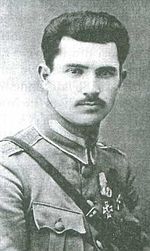Gherman Pântea, Date of Birth, Place of Birth, Date of Death
TweetGherman Pântea
Romanian politicianAbout Gherman Pântea
- Gherman V.
- Pântea (Romanian pronunciation: ['german 'p?nte?a]; surname also spelled Pîntea; Russian: ?????? ?????????? ?????, German Vasilievich Pyntya; Ukrainian: ?????? ?????????? ?????, Herman Vasilyovich Pyntya or Pintia; May 13, 1894 – February 1, 1968) was a Bessarabian-born soldier, civil servant and political figure, active in the Russian Empire and Romania.
- As an officer of the Imperial Russian Army during most of World War I, he helped organize the committees of Bessarabian soldiers, oscillating between loyalty to the Russian Provisional Government and the cause of Bessarabian emancipation.
- Pântea was subsequently Military Director of the Moldavian Democratic Republic, answering to President Ion Incule?.
- He personally created a Bessarabian defense force, tasked with combating Bolshevik subversion and Russian intimidation, but also braced for defeat after the October Revolution. With some hesitance, Gherman Pântea endorsed the Republic's union with Romania, affiliating with the local Bessarabian Peasants' Party, then with Romania's National Liberals.
- Having parallel careers as teacher, lawyer and journalist, Pântea remained a presence in Romanian political life, as member of Parliament, negotiator of détente with the Soviet Union, and three times Mayor of Chi?inau.
- He was however mistrusted for his defense of arrested Bolsheviks, his critique of centralized government, and his alleged corruption.
- During World War II, Pântea was Mayor of Odessa under a Romanian occupation.
- He intervened to save Jews from the 1941 Odessa massacre and the subsequent deportations to camps in Transnistria.
- He had a tumultuous relationship with Ion Antonescu, the Romanian dictator, and was kept in check by the occupation authority.
- His administration managed to set in motion a plan for Odessa, and helped the city overcome devastation through the adoption of free trade, but also created various controversies. Pântea was long suspected of war crimes, and spent much of his post-war life as a fugitive.
- He was eventually apprehended, and became a political prisoner of the Romanian communist regime.
- In 1956, he managed to have the war crimes verdict overturned but, albeit rehabilitated in part, continued to be harassed by the communist apparatus until the 1960s.
Read more at Wikipedia
See Also
- Famous People's Birthdays on 13 May, Moldova
- Famous People's Birthdays in May, Moldova
- Famous People's Birthdays on 13 May, Romania
- Famous People's Birthdays in May, Romania
- Famous lawyer's Birthdays on 13 May, Moldova
- Famous lawyer's Birthdays in May, Moldova
- Famous military personnel's Birthdays on 13 May, Moldova
- Famous military personnel's Birthdays in May, Moldova
- Famous politician's Birthdays on 13 May, Moldova
- Famous politician's Birthdays in May, Moldova
- Famous diplomat's Birthdays on 13 May, Moldova
- Famous diplomat's Birthdays in May, Moldova
- Famous lawyer's Birthdays on 13 May, Romania
- Famous lawyer's Birthdays in May, Romania
- Famous military personnel's Birthdays on 13 May, Romania
- Famous military personnel's Birthdays in May, Romania
- Famous politician's Birthdays on 13 May, Romania
- Famous politician's Birthdays in May, Romania


 Date of Birth:
Date of Birth:  Place of Birth: Zăicani, Rîșcani District, Moldova
Place of Birth: Zăicani, Rîșcani District, Moldova